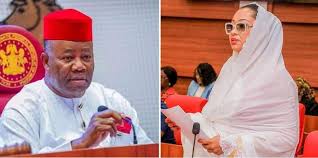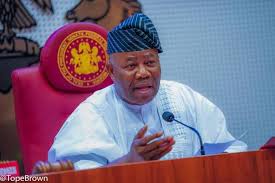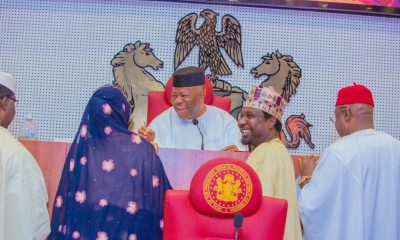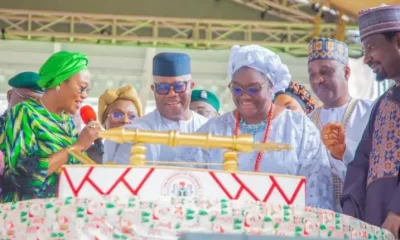Comments and Issues
The hole in Justice Nwite’s judgement on the Akwa Ibom Northwest APC Senatorial candidate
Published
3 years agoon
By
Publisher
By Celestine Mel
First things first. Every opinion canvassed in this writ is that of an unlearned layman – me. Yes, I am not a lawyer. I have never pretended to be one. As such, my reading and understanding of the law comes from the perspective of ordinary everyday learning. I am learning to accept many things that I thought were impossible. Probably, lawyers are called learned because they already know that anything is fair in love and war; everything is possible in law. Else, how could plain text requirements, written in simple ordinary everyday English, be so hard to understand and operationalize to the extent that we need different layers of courts to adjudicate our conduct, to be sure that it conforms with the requirements of these letters?
As I ruminate over this topic, my mind darts back to my father, who died on the first day of 1986. He told me that written agreements were invented by bad people who refused to honor verbal agreements; people without honor. I remember asking him to explain the thinking behind the need for judges to sit in courts (and councils) to pass judgement over fellow men as if they were God. After all, at Sunday School, we were told that God is the judge over all creation and would determine our suitability for heaven – the place of bliss and blush (I hope Gov. Ben Ayade forgives my use of one of his many confusing budget titles here), depending on our adherence to the strict codes of conduct, in the good book. His answer quoted verbatim as follows, has stuck with me unto this day: _*My son, make sure you avoid anything that would take you to a place where human beings sit in judgment over you. If you do, you would know the difference between God and man*_. We shall get back to this topic, another day.
The paradox of the law in our democracy is that it is written by unlearned everyday men in the national assembly, and subsequently given to the learned men of the judiciary to interpret. One may then ask, who should be in a better position to interpret the law between the men and women who wrote it, and the white-silk-wearing judges who need to through the letters of the law, with a toothcomb, to imagine what the writers meant when they wrote it the way they did, and then to interpret same judiciously? This is an academic exercise for another day.
Since Justice Emeka Nwite of the High Court 7 of the FCT – Abuja, handed down his judgement on the disputed Akwa Ibom North West Senatorial District APC primary election result, ordering INEC to accept and publish the name of Senator Godswill Akpabio as the winner of the primary election and therefore, the rightful candidate to contest the senate seat, a lot of divergent opinions have been canvassed on the subject. Predictably, supporters of the former minister of Niger Delta Affairs, have been rightfully celebrating to the moon and back, overjoyed that indeed, the immediate-past INEC REC for Akwa Ibom, Mr Mike Igini (my good friend some would note), whom I mounted stiff media campaign to defend, after he came under vicious well-funded coordinated attacks, for sticking by the rules, has been put to shame. This is understandable and completely in order, because the verdict has breathed life back into their hero’s fortune, as the season reaches its crescendo soon.
Senator Akpabio is not a push-over politician by any stretch. His inability to get on the ballot in his own terms, would have projected weakness and dented his sensational political trajectory, especially given the pinfall that he suffered in 2019 wherein, an underrated Senator Chris Ekpenyong, defeated him to clinch the senate seat. The intention of this intervention is not to _put sand-sand into the garri_ of the celebrators, (that would be too vicious). No. Rather, it is to interrogate the verdict, in order to put things in perspective and further the course of deepening our democracy. It is the least that an unlearned citizen like me can do.
For some of us who follow political developments, I know that the APC in my state has been mired in crisis since the last four years. However, Section 84(1 & 13) of the 2022 Electoral Act which deals with nomination of candidates by political parties, seem to have been totally and conveniently negated by Hon Justice Nwite in his judgement. The two clauses which I shall quote below, stand in contrast to his curious judgement. Let us see read the contents of these two clauses and juxtapose with the judgement of Emeka:
*84(1): _A political party seeking to nominate candidates for election under this Act SHALL hold primaries for aspirants for ALL elective positions which SHALL be monitored by the Commission.*_ *4(13): _Where a political party fails to comply with the provisions of this Act in the conduct of its primaries, its candidate for election SHALL NOT BE INCLUDED IN THE ELECTION for the particular position in issue.*_ These provisions are express and unambiguous.
My understanding is that whenever a law, rule, standard or guideline contains the conditional word, *SHALL*, then such provision is *mandatory, compulsory and binding.* If the SHALL condition has not been met by whomsoever operates the rule, law or standard, then such a person is non-compliant. And as clause thirteen says, the candidate *who emerged from a non-compliant process SHALL NOT BE INCLUDED IN THE ELECTION.* That should not be hard to interpret. Indeed, it does not require interpretation. Again, my unlearned view,
I have taken time to read and re-read the electoral Act. I have also taken time to read snippets of the judgement. There is a huge gulf of difference between the letters of the act in plain-text, and the strange interpretation by the learned judge. According to Justice Nwite, “INEC cannot unilaterally pronounce a primary conducted by a political party or a candidate submitted to it as invalid, without a valid court order.” Not stopping there, the judge went on as follows: “the consequences of the defendant’s (INEC’s) failure to monitor the legal primary conducted on June 9 by the first plaintiff, cannot be visited on the plaintiffs. The defendant lacks the vires to usurp or assume the power of the court to disqualify a candidate.”
This writer agrees that the law does not give INEC the power to pick and choose who would be the candidate of a political party. That is the business of the political party. However, the same law clearly stipulates processes that need to be followed to confer validity on any primary election, failing which whomsoever emerges from that process cannot be accepted by INEC as a candidate for the particular election. And it is exactly what INEC did by holding back from publishing the names of returned candidates who emerged from processes that were not in compliance with the act. INEC clearly has the power to exclude any candidate who it determines, did not emerge from valid primaries, from the list of candidates for election. The Electoral Act says so clearly and expressly.
Secondly, the primary election which produced HE Senator Akpabio, was staged in the dead of the night on the day before close of nomination. There is no doubt that INEC in functional normal form, could not have possibly been able to attend the event, even when the other contenders for the ticket were in the dark about the decision of the APC HQ to cancel the initial factional primary, which was held and won by someone else. Assuming without conceding that the internal crisis in the APC AKS did not tear the organization apart, chances are, INEC would not have possibly been in that venue to monitor the election, irrespective. Thirdly, the fact of the absence of other candidates who expended huge resources to procure nomination forms from the entire judicial process, should have raised the eyebrows of the learned judge to asking the reason why none other party apart from INEC was joined in the suit.
It emerged that a similar suit on the same matter between DIG Udom Ekpoudom and the APC was already on-going at the Federal High Court-6, Abuja-FCT, at the time the Chief Judge of the FCT assigned the new suit to High Court 7. As a layman, I do not know the behind-the-scene intrigues that go into judicial processes. However, common sense suggests to me that two similar cases, running side-by-side in two courts of coordinate jurisdiction within the same territory, could have been better consolidated, in order not to create judicial confusion. In High Court 6, the plaintiff is Ekpoudom vs APC. In High Court 7, the plaintiff is Akpabio vs INEC. Both men are laying claim to winning the party’s ticket for the same senate seat. While INEC has the name of Ekpoudom in its report as the winner, APC forwarded the name of Akpabio to INEC as their candidate. In compliance with the Electoral Act 2022, INEC refused to publish either of the names. In my opinion, INEC took the right action in the circumstance as prescribed by the Act.
Those who argue that INEC cannot be a judge in its own case miss the point. INEC is a regulator of the political system in Nigeria. It is the agency that operationalizes the Electoral Act, just as the Central Bank of Nigeria (CBN), for example, is the agency that operationalizes the Banking and Other Financial Institutions Act (BOFIA) 2020. It would be absurd to say that CBN should not punish a Bank which has run foul of the express provisions of BOFIA, which requires that banks should file their regulatory returns using the International Financial Reporting Standards (IFRS-9) every second day of the month, on the pretext that CBN is not a court of law and so, cannot enforce a legal provision of BOFIA, unless ordered to do so by a law court. That would bring anarchy into the financial system.
From the reasoning of Justice, it means that INEC can include my own name in the roll of candidates for the coming election if any of the political parties forwarded it to them, irrespective of whether or not I am a member of a political party or have any connection with politics. Stretching it further, it would therefore mean that INEC would be bound to take anything that comes from any political party as a lame-duck toothless regulator. Again, that would be invitation to anarchy, considering how irresponsible our politicians are.
Regulatory agencies exist to level the ground for operators. Some persons seem to see and regard INEC as an operator rather than a regulator that it is. As a result, they are afraid that INEC can misuse its powers in the course of discharging its regulatory mandate if let loose hence, the agency is gaged with judicial hamstrings which bind the arms, legs and eyes. Courts are loaded with expectation of making determinations regarding election operational issues. Nothing could be further from the ideal. INEC is an agency of government saddled with the responsibility to regulate and manage the electoral process. It is the umpire. Like the umpire in a game of football, it is required to enforce the rules of the game among participants and ensure that guidelines, laws and regulations governing the game are strictly followed. As is the practice in any game, the umpire can make mistakes and participants can then approach arbitrators to seek redress. But asking that the referee should not even blow the whistle to apply appropriate infringement calls against a player in the field of play, but should instead defer to arbitrators to seek clearance each time an infraction is spotted on the field, before calling for a free kick, throw-in, penalty kick, drop-ball or countermand the introduction of an unqualified or unsigned player, is akin to castrating the umpire of all its inherent abilities to regulate the game.
There are reports circulating in the media that a fringe interest group in INEC has been surreptitiously working in cahoots with politicians, to undermine the electoral process and reverse the gains that INEC has so far made. They stamp and certify forged documents to aid politicians execute their plots. The circumstance of the Akwa Ibom and Yobe cases tend to give credence to this fear. We cannot afford to have a judiciary that acts without an eye on the corrosive impact of their judgements on the society at large. We cannot afford an INEC peopled by staff who connive with politicians to subvert the process. We cannot afford to play games that lead to immediate gains for political players, but corrode the good functioning of the society in the long run. The judiciary and INEC need to understand the enormity of the responsibility on their shoulders as we approach the finish line in this election round. It is time the Chief Justice of Nigeria steps in once more, to call his men to order.
Or we could just scrap INEC and hand over the regulation of the political system to judges once and for all. Is this not Nigeria??
- Celestine Mel is a chartered banker and IT Projects lead. He writes from Abuja.
You may like
Natasha: Ex-Lawmaker urges Akpabio to step aside for impartial investigation


Court orders Akpabio, others to file defence in Natasha’s suit


Senate declares Edo Central Senatorial District vacant


Senate resumes, pledges to work hand in hand with Executive


Senate resumes plenary after 30 days recess


Akpabio @61, an extraordinary man, uncommon in our generation – Remi Tinubu
Trending

 Health6 days ago
Health6 days agoDeclassified CIA memo explored concealing mind-control drugs in vaccines

 Entertainment1 week ago
Entertainment1 week agoSimi addresses resurfaced 2012 tweets amid online backlash

 Crime6 days ago
Crime6 days agoSenior police officers faces retirement after Disu’s appointment as acting IGP

 Education1 week ago
Education1 week agoPeter Obi urges JAMB to address registration challenges ahead of exams

 Health1 week ago
Health1 week agoNAFDAC issues alert on suspected revalidated SMA Gold infant formula

 Comments and Issues7 days ago
Comments and Issues7 days ago20 Critical Fixes to Save Nigeria’s Democracy from Electoral Fraud

 Football1 week ago
Football1 week agoMartínez ruled out of Everton clash with calf injury

 Latest7 days ago
Latest7 days agoICPC yet to respond to El-Rufai’s bail request as arraignment date looms

